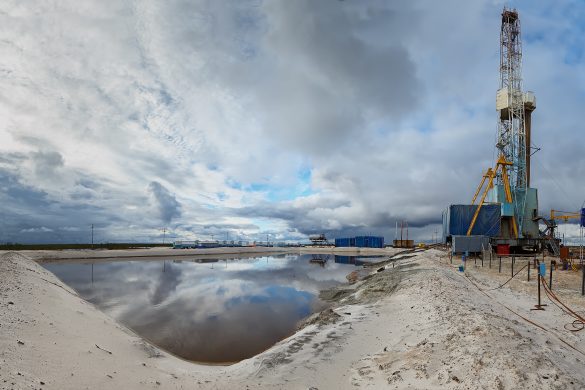Coalition of over 30 organizations, representing vast majority of Texans and variety of industries supporting virtually every aspect of Texas, joins together to support economic growth, oppose SB 421
AUSTIN – Over 30 organizations representing industries that employ millions of Texans and benefit the daily lives of everyone in the state have joined together in opposition to SB 421, being considered today in the Senate State Affairs Committee. SB 421 proposes burdensome and unnecessary new regulations that will impede economic expansion, restrict job growth and incentivize litigation.

The Coalition for Critical Infrastructure (CCI) represents public and private entities including cities, counties, water districts, railroads, electric utilities, gas utilities, pipelines, business advocacy groups, manufacturers, and litigation reform groups. Other organizations that have joined CCI in opposition to SB 421 include chambers and economic development organizations that represent a majority of the state’s population, port authorities and our state’s energy producers.
The members of the Coalition for Critical Infrastructure and the organizations that oppose SB 421 support a process that balances the importance of private property rights and encourages critical infrastructure projects that power the economy – without creating incentives for litigation and delays.
CCI’s members value private property rights and recognize the importance of critical infrastructure to support Texas’ tremendous growth, its communities, its job creators and the quality of life for its residents. Texas is the fastest growing state in the country and widely considered to be the best state to do business. The State of Texas is forecasted to attract over 200,000 new residents every year though international and domestic migration. The total population will expand from 28.7 million in 2018 to 40.9 million in 2048, a 44% increase. In order to support our state’s growth, the ability to continue to build and expand infrastructure cannot be hampered – infrastructure that every Texan relies on such as transmission lines, roadways, water supply pipelines, drainage and flood control, and pipelines for oil, natural gas and transportation fuels.
According to an upcoming study on critical infrastructure commissioned by CCI:
“Infrastructure spending expands the capital stock of the Texas economy, drives the production and delivery of goods and services, and positively affects business and household incomes.
“Investments in infrastructure have been estimated to increase productivity in the private economy. The spending itself is an important part of the economy, providing jobs and income to millions of Texans. It directly represents 1.6% of gross state product (“GSP”). Indirectly it also generates a multiplier impact, in this case, the 1.6% of GSP has a positive impact equal to 2.9% of Texas’ GSP. This translates to $53.9 billion for 2019 ($50.2 billion in real, 2012$), and an average of $70.3 billion per year in real terms over the next 30 years. By 2048, this increased rate of economic growth will generate a 7.2% increase in GSP for Texas, or $268 billion. On average over the 30 year period, GDP increases by $168 billion.
“Infrastructure investment is critical to the economic well-being of Texas. These investments enhance mobility of people, goods and services, and power and provide our citizens with increased business and work opportunities. They affect the health and well-being of urban and rural communities. Also, continuous re-investment is important to sustaining and advancing Texas’ competitive advantage in the worldwide marketplace.”
CCI and its members believe that current Texas law strikes an appropriate balance between the interests of property owners, the public and entities engaged in building infrastructure projects for public use. At the same time, CCI has worked in good faith to develop solutions to identified concerns. Unfortunately, as filed, SB 421 makes changes that will thwart critical infrastructure projects and investment that are essential to the growth and prosperity of Texas and every single Texas family, business and community.
Under current law, Texas has a transparent and well-balanced process that delivers relevant information to landowners in a timely fashion, assures that landowners can communicate with project entities, protects landowners’ use of the property to the greatest practicable extent, and preserves the landowner’s ability to seek a remedy via the special commissioners and, if necessary, the litigation process.
Strong relationships with landowners are vital to construction and maintenance of necessary infrastructure. The vast majority of right-of-way acquisitions for public use are concluded by voluntary agreement, not by the use of eminent domain authority. Entities seeking to acquire property for public use offer at least the appraised fair market value of the property and, in many cases, more than the appraised value to incentivize voluntary settlements. Entities also work directly with landowners to provide detailed information regarding the proposed project and fair compensation.
SB 421 revises current law in a way that will severely impede ability of the industries represented by the Coalition for Critical Infrastructure to meet the needs of Texans and will drive capital and jobs out of Texas. The bill incentivizes and actually encourages a new, unprecedented level of litigation by encouraging cases to go to court, mandates unmatched, onerous hearing requirements that are replete with procedural “gotchas” and introduces technical procedures and vague concepts that make compliance for infrastructure projects functionally unworkable.
What coalition members are saying about critical infrastructure and SB 421:
“Many royalty owners are landowners too and need critical infrastructure of all kinds to run their families’ ranches, farms and small businesses. Many of Texas’ 600,000 royalty owners have engaged in the right of way process and believe that current law is serving Texans well. Like our rights as landowners, our members place a high value on mineral property rights and the infrastructure necessary to allow oil and natural gas production to continue. SB 421 creates an unworkable process and unnecessary regulations that will delay and discourage infrastructure investment, ultimately devaluing property and economic potential for Texas families.” – Tricia Davis, President, Texas Royalty Council
“Our electric system is the backbone of Texas, providing the electricity we need to keep the lights on, keep homes cool, and power economic development. SB 421 contains penalty provisions that lack objective standards and could subject Texas businesses to unfair litigation.” – Julia Rathgeber, President & CEO, Association of Electric Companies of Texas
“Texas can protect the rights of property owners and provide critically needed infrastructure, but SB 421 would put vitally needed services for Texans at risk. Interestingly, the Texans most concerned about SB 421 are not necessarily the entities using eminent domain but those business and communities that need electrical services and fuel supplies to meet the needs of millions of Texans.” – Todd Staples, President, Texas Oil & Gas Association
“TLR is respectfully opposed to SB 421 in its present form because the penalty provision will encourage litigation and cause delays that are likely to be crippling to the timely development of our state’s critical infrastructure. For twenty-five years, TLR has fought the adverse consequences of state laws that incent lawyers to foment litigation for their own benefit, which we believe this bill will do.” – Lee Parsley, General Counsel, Texans for Lawsuit Reform
“Only through constructive collaboration can the pipeline industry and landowners identify areas of agreement that preserve the rights of property owners, while simultaneously allowing the development of infrastructure projects that are absolutely vital to the economic development of the state. As filed, SB 421 is not the answer as it will create one of the most onerous processes to construct oil and gas infrastructure in the nation. SB 421 would impose substantial impediments on the Texas economy and halt proposed expansions in the manufacturing and chemical industries. All Texans who rely on ready, affordable access to basic necessities, such as energy to fuel their homes and businesses, should oppose this legislation as filed and continue to seek solutions that are good for all Texans.” – Thure Cannon, President, Texas Pipeline Association
“Manufacturers need critical infrastructure that delivers electricity, water and raw materials to create quality jobs and maintain Texas’ standing as the #1 exporting state in the nation. Senate Bill 421, as drafted, is a major threat to sustaining the strongest job growing environment in the United States. The economic fallout from infrastructure delays created by SB 421 would be real and substantial.” – Tony Bennett, President, Texas Association of Manufacturers
“Senate Bill 421 would negatively impact employment growth, oil and natural gas production, and severance tax revenue to the state. TIPRO remains committed to working with all stakeholders to maintain a system that recognizes the dominance of the mineral estate in Texas, the importance of pipeline infrastructure, existing laws and regulations, and the protection of private property rights.” – Ed Longanecker, President, Texas Independent Producers & Royalty Owners Association
“The Texas chemical industry has seen significant expansion as a result of the shale economy, which depends on natural gas and natural gas liquids as its principal feedstock for manufacturing the thousands of products that improve the quality of life for Texans and billions around the world. SB 421 as filed will significantly impact the ability for chemical manufacturers to receive products and supplies critically important to operate in Texas.” – Hector Rivero, President & CEO, Texas Chemical Council
“Texas record oil and gas production supports many jobs, communities, and our American energy independence. However, this record production is a meaningless number if we cannot get our Texas oilfield products to market. SB 421, as written, puts the future of our energy production, jobs and economy in jeopardy.” – Jim Beck, Chairman, Texas Alliance of Energy Producers
“SB 421 will stop the development of the essential arteries needed that pump the oil and gas out of the Eagle Ford Shale region. The Eagle Ford Shale has transformed a region that once had the highest unemployment, little access to quality healthcare, little tax revenue, and schools that had almost no funding into a region that now has among the lowest unemployment rate in the nation, access to healthcare, large increases in tax revenue, and brand new cutting edge schools. Without access to new pipelines, Eagle Ford production will be greatly threatened. I cannot think of a bill that will harm rural Texas more than SB 421.” – Chris Ashcraft, Interim President, South Texas Energy & Economic Roundtable
+++









